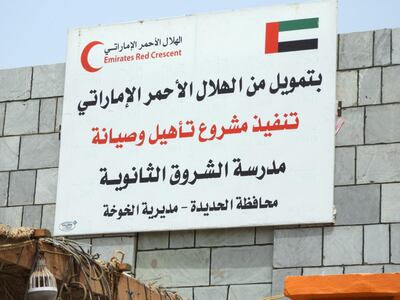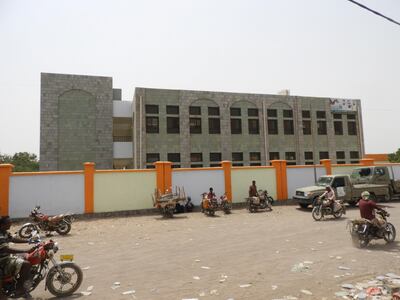Umm Abdullah could not find the words to describe how it felt to be back in her home in Al Khokha district of Yemen’s Hodeidah province.
Umm Abdullah and her family had fled their village of Al Katabah more than two years earlier and were living with relatives in Abyan province in the south of the country.
They were able to return after Yemeni government forces — backed by an Arab coalition — liberated Al Khokha from the Houthi rebels in December 2017. The Iran-backed militias had taken control of the district in 2014.
"Thank God, we are back home," Umm Abdullah, 60, told The National. "Our residence was partially damaged, but nothing compares to stepping into my yard after two years. The feeling is indescribable."
Like Umm Abdullah's family, many displaced people have started returning to Al Khokha, where they say life is slowly but surely returning to normal after the Houthis were driven out.
So far, more than 1,800 families — who had been living in Aden, Lahj and Abyan — have returned home.
____________
Read more
How Houthis defend Hodeidah and how coalition is outfoxing them
Yemen rebels suffer ‘major collapse’ on west coast, coalition says
____________
Life has returned to Al Khokha’s streets with crowded markets, new shops opening and people bustling back and forth. Residents have begun repairing their homes, and fishermen and farmers are gearing up for the new season.
"I missed it so much," Mohammed Jubaili, 50, told The National as he ploughed a field.
“We are afraid of landmines that the Houthis planted in our farms, but that will not prevent us from working. I missed my land like I would miss my own mother.”
Eight people including two farmers were killed by landmines around Al Khokha on Saturday, an officer in the pro-government Tihama Resistance forces told The National.
The farmers were killed while working their land in the Al Kadah area east of Al Khokha, Col Yehya Ayish said.
Another six civilians were killed when their motorcycles ran over landmines in Al Masharifah village between Al Khokha and Tuhaiyta, he said.
Residents of Al Khokha say that rebel landmines have caused more casualties than the fighting in the area.
The UAE Armed Forces and Yemeni troops collect between 250 and 300 landmines every week in the western coastal region. More than 40,000 have been neutralised since coalition-allied forces took control of the Red Sea coast in a series of battles starting in 2016.
In Al Khokha, the Emirates Red Crescent (ERC) has gone above and beyond to improve the lives of civilians, according to residents.

Mahmood Maroof, relief coordinator in Al Khokha, said the ERC had launched a number of projects to improve education, health and power supply.
"They have repaired 11 schools and two hospitals," he told The National. "They have also provided the district with five generators and are working to repair water pipes, which is 90 per cent done.
“All of this was done quickly and efficiently, in a very short period of time.”
Mr Maroof said that the residents were very grateful for the efforts exerted by the Emirates, which intends to send more aid convoys to the areas that are no longer under Houthi control.

The UAE has said it was sending 10 ships and three aircraft carrying aid to Hodeidah following instructions of Sheikh Mohammed bin Zayed, Crown Prince of Abu Dhabi and Deputy Supreme Commander the Armed Forces.
The ERC aid corridor will see the 10 UAE vessels carry 13,500 tonnes of foodstuffs as an accompanying emergency aid airlift gets under way with three flights carrying 10,436 food parcels.

